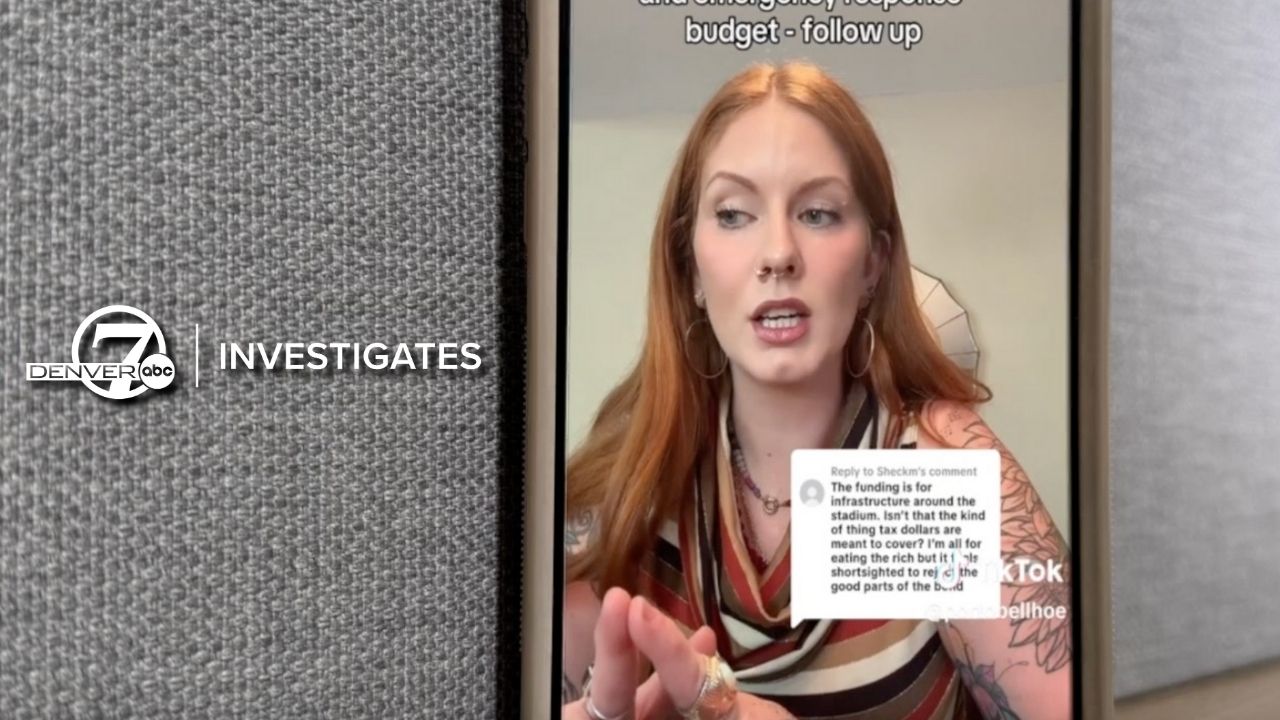DENVER — A Denver woman took to TikTok to voice her concerns after reading through issue 2A, which will be on the ballot for Denver voters during the November election.
Katherine Wood called our sister station, Denver7 Investigates, under the impression that passing Ballot Issue 2A would mean taxpayer dollars would go directly towards building the potential new Denver Broncos stadium. But she was wrong, according to city officials spearheading the initiative.
"It's classic misinformation," said Patrick Riley, the program manager for the Vibrant Denver bond, which 2A is a part of. "It's completely untrue."
Ballot Issue 2A allows Denver to increase the city's debt by $441,420,000 for dozens of infrastructure projects, including near Burnham Yard, the preferred site for the new football stadium. Some others include multimodal projects along the Santa Fe Arts District and West 38th Avenue, as well as safety improvements on Evans Avenue.
The Ballot Issue Notice not only outlines the language voters in Denver will see on their ballots, but the booklet also outlines fiscal impacts and arguments for and against each issue.
- Read the full Ballot Issue Notice below
Under Ballot Issue 2A, the comments against the measure read in part, "This bond prioritizes over $100 million in infrastructure at Burnham Yard—now confirmed as the preferred future football stadium site, owned by one of the wealthiest families in the world."
This is where Wood said her misunderstanding sparked.
"There are projects that are in the general area of where the stadium has been announced to go, that's the 6th and 8th Avenue bridges. They're completely unrelated to the Broncos stadium," Riley clarified.
Verbatim language of Denver Ballot Issue 2A:
WITHOUT IMPOSING ANY NEW TAX, SHALL CITY AND COUNTY OF DENVER DEBT BE INCREASED BY $441,420,000 WITH A MAXIMUM REPAYMENT COST OF $906,000,000, TO BE USED FOR REPAIRS AND IMPROVEMENTS TO THE CITY’S TRANSPORTATION AND MOBILITY INFRASTRUCTURE AND FACILITIES, INCLUDING BUT NOT LIMITED TO:
THE FUNDING FOR THESE IMPROVEMENTS SHALL COME FROM THE ISSUANCE AND PAYMENT, OR REFINANCING, OF GENERAL OBLIGATION BONDS, NOTES, OR OTHER OBLIGATIONS. ADDITIONALLY, SHALL THE TAXES AUTHORIZED AT THE CITY’S BOND ELECTIONS IN 2007, 2017, AND 2021 BE EXTENDED AND AUTHORIZED TO PAY OR REFINANCE THE DEBT AUTHORIZED AT THIS ELECTION IN ADDITION TO THE DEBT AUTHORIZED AT SUCH PRIOR ELECTIONS?
FURTHERMORE, SHALL CITY AD VALOREM PROPERTY TAXES BE INCREASED WITHOUT LIMITATION AS TO RATE BUT NOT MORE THAN A COMBINED EXTENDED MAXIMUM AMOUNT OF $81,589,840 ANNUALLY, WITH THE CITY TO PUBLICLY REPORT SUCH EXPENDITURES ANNUALLY?
Wood, who said she read Denver's Ballot Issue Notice multiple times and thought she had a comprehensive understanding of the measure, posted a video to social media and explained her original concerns.

The TikTok garnered thousands of views, more than 1,200 likes and nearly 200 shares. Many people who commented on the video vocalized opposition to taxpayers funding a new Broncos stadium, while others tried to correct the misinformation.
"It took, you know, hundreds of comments and multiple even strangers interacting and discussing this together to understand what they're actually asking us to vote for," said Wood.
A few days later, after coming to understand that Ballot Issue 2A would fund projects near the stadium and not the stadium itself, Wood posted another video acknowledging her mistake.
"After a couple people kind of talked to me, I realized that I was sort of misunderstood and I kind of managed to spread misinformation accidentally," Wood said in her second video.

However, that clip has not gotten nearly as much traction as Wood's original video.
"I tried to take ownership of that. And even now, as more people are commenting on the original videos, I'm saying like, 'Please, go watch the other follow-up,' and you know, and reiterating like, no, it's not the actual stadium."
Denver7 asked the bond's project manager how social media impacts his job when trying to spread information about ballot measures.
"It makes it harder," Riley said. "It's easy to amplify a lie."

Both Riley and Wood hope this incident reminds voters to scroll through social media with a certain level of skepticism this election season and research each measure extensively before voting.
"Source from multiple locations," Riley said. "Don't just take the first thing you see. Look at someone's post history. See what they said before. See what they're saying now."
Wood encourages younger voters to read through the entire Ballot Issue Notice.
"The local elections affect our every single day life. They affect the roads we drive on, you know, and we're lucky enough, like I said, to live in a city that sends us this information."



